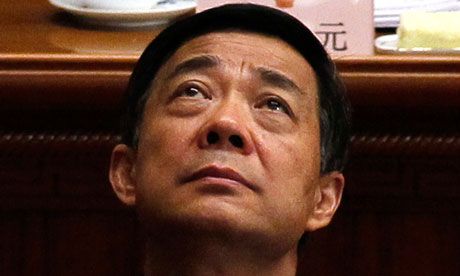Bo Xilai officials 'wiretapped call to President Hu Jintao'
New claims may shed light on why Bo – previously accused of unspecified disciplinary violations – was ejected from post

Bo Xilai, the former party secretary of Chongqing. Photograph: Ng Han Guan/AP
The spotlight on the Bo Xilai affair has turned back on to political tensions in China following reports that officials in Chongqing wiretapped a call to the country's president, Hu Jintao – helping to trigger the scandal that unseated Bo.
Official accounts of the case have portrayed it as being unrelated to the political struggle for power in the country. Bo is instead accused of unspecified disciplinary violations while his wife, Gu Kailai, is accused of murdering the British businessman Neil Heywood.
But the New York Times, which cited almost a dozen sources with ties to the Communist party, said the wiretapping was seen as evidence of Bo's overreaching ambition and compounded leaders' mistrust of him.
It said anti-surveillance devices detected that the call to Hu, made by a senior anti-corruption official in Chongqing last August, was being monitored. Bo was party secretary of the south-western city at the time.
The incident encouraged disciplinary and security officials to investigate Bo's police chief and ally, Wang Lijun. That is thought to be one of the factors that ultimately led to Wang's flight this year to a US consulate, where he alleged that Gu had murdered Heywood.
Jean-Pierre Cabestan, professor of political science at Hong Kong Baptist University, described the wiretapping as "a kind of betrayal".
He added: "This is more than the killing of one man. That was the last straw, but I think before that, and even without that, [Bo] was already being investigated and would have been forced into retirement or something more serious.
"It underscored how much mistrust you have among leaders and particularly between Bo and some of the people in the centre."
According to the New York Times, a preliminary indictment in March accused Bo of damaging party unity by collecting evidence on other leaders.
But Bo Zhiyue, an expert on elite politics at the University of Singapore and no relation of Bo Xilai, thought it unlikely that authorities would disclose such matters publicly.
"It may [prove to] be a fact that Bo Xilai did all these things for his own advancement but it is too damaging to make public," he said.
"Who knows who else might be involved? It would be a lot more complicated," he said.
The New York Times said the eavesdropping operations in Chongqing began as part of a surveillance project overseen by Wang, which was officially intended to tackle crime and maintain stability in the area but went much further.
One political analyst, citing information obtained from a colonel, alleged Bo sought to tap the phones of virtually all high-ranking leaders who visited the city – including Zhou Yongkang, the security boss thought to be Bo's main defender among senior leaders.
"Bo wanted to be extremely clear about what leaders' attitudes toward him were," the analyst told the newspaper.
The newspaper said that in the case last August, Ma Wen, minister of supervision, was calling Hu on a high-security land link from the state guesthouse in Chongqing, which was monitored on Bo's orders. After learning of the tapping, Beijing turned central security and disciplinary investigators on to Wang, whom Bo blamed for the incident.
The political analyst told the New York Times that the party's central commission for discipline inspection had stationed up to four teams in Chongqing – two of them undercover – by the beginning of 2012. One focus was a corruption case in a city where Wang was once police chief.
A party academic with ties to Bo said Wang had twice filed complaints to the inspection commission before his flight to the US consulate, claiming Bo had "opposed party central" authorities, including ordering the wiretapping of central leaders. The requests were rejected.
But Bo was furious to learn that Wang had also monitored calls by him and Gu, sources said. Following Wang's flight he detained his wiretapping specialist, a district police chief named Wang Pengfei.
With attention to the Bo family's finances growing, his brother resigned from a Hong Kong-listed company, China Everbright International, late on Wednesday. The company said the decision was taken "to minimise any possible adverse impact on the company of certain reports recently published by the media on his family background".
Bo Xiyong, who had been vice-chair at the company since 2003 under the name Li Xueming, held around 10m of its shares, worth around $4.2m.
A commentary in the state-run tabloid Global Times accused the west of using the case to score cheap points.
"Bo is being investigated in accordance with the law. This news is really explosive, but will not shake China's political foundation," it said.
"Most western people are unfamiliar with Bo's name and Chongqing. It is illogical that the mainstream western media places so much attention on Bo's case," it complained.
It claimed the Chinese public's interest in the case was dwindling. Chinese media have not been able to report on it beyond reprinting the official Xinhua announcements.
by:guardian.co.uk
No comments:
Post a Comment